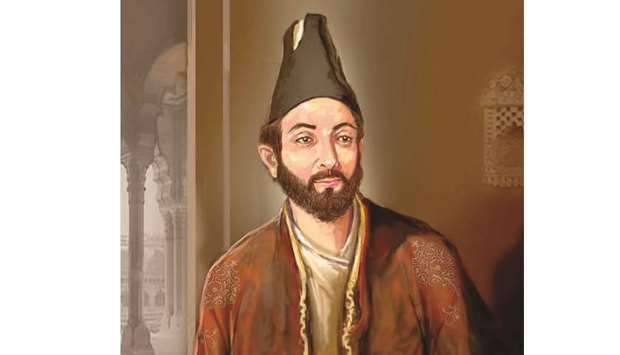“The thing that distinguishes an artist from a non-artistic person is imagination,” once said Altaf Hussain Hali, a famous Urdu poet and critic, while praising the works of Mirza Asadullah Khan Ghalib.
Ghalib is a world-known Urdu poet. A Qatar-based Urdu literary organisation recently organised a programme in collaboration with Qatar National Library (QNL) to remember the poet on his 150th death anniversary.
The event ‘Remembering Mirza Ghalib: A Lecture and Poetry Night’ was organised both in English and Urdu by Bazm-e-Urdu Qatar (BUQ) and its affiliated group Guzergah-e-Khayal that focuses on Ghalib only, at QNL Education City, Doha.
The programme, attended by a select gathering of Urdu lovers, highlighted the timeless relevance of Ghalib and his mesmerising poetry.
BUQ is the oldest Urdu literary association formed in Qatar in 1959 with an idea of promoting Urdu literature among the Indian and Pakistani diaspora. Guzergah-e-Khayal Forum, founded in 2009 is also a literary organisation dedicated to Mirza Ghalib. Guzergah has been organising monthly Ghalib symposium since 2012, inviting prominent literary personalities of Qatar, including poets, writers, scholars and Ghalib-experts to appraise and discuss works of Mirza Ghalib. The event was officially opened by Dr James Onley, Convener of QNL, and Sayeed Mohammed, co-organiser and co-ordinator of Talk Series. Speaking on the occasion, Dr James and Sayeed highlighted about the importance of the event.
Faisal Hanif, Chairman of BUQ and Founder President of Guzergah-e-Khayal, welcomed the gathering. He also moderated the session. Abul Khair Khan, a local ghazal singer, opened the night with her ik baat pye kehty ho, a famous ghazal by Ghalib.
Though, most of the people must have heard of Ghalib in their lifetime, but very few people know about his life in the Delhi court and beyond. Mohamed Rafique Shad Akolvi, President of BUQ, shed light on Ghalib’s turbulent life and his creative genius as a poet of Urdu and Persian. Wazir Ahmed, Vice President of Guzergah-e-Khayal, adorned in classical attire, also recited Ghalib’s ghazal. His passion and love for Ghalib was visible in his voice and expression. Iftekhar Raghib, General Secretary of BUQ, made symbolic connections of Ghalib’s poetry with modern scientific thinking. He deconstructed Ghalib’s phrases into modern language and gave a new interpretation. Ghalib referred his phrases from a scientific perspective, in the context of evolving natural sciences in Europe in his time.
Professor Mohammed Hassaan Khan from Barkatullah University, Bhopal briefly spoke about Ghalib’s connection with Bhopal.
Faisal Hanif spoke briefly about some of the unique and creative aspects of Ghalib’s prose and poetry and his continuous relevance in many forms. He also alluded to his passive hostility towards works of Sir Sayyed Ahmed Khan.
Talking to Community, he said, “Najam-ud-Daulah, Dabeer-ul-Mulk, Nizam Jang Nawab Mirza Asadullah Khan Ghalib was born in 1797 and died in 1869. He is considered as one of the greatest, mightiest and most versatile poet of the Urdu language. He is among the very greatest for his poetry in Persian. He sets impossible benchmarks and milestones in poetry. His poetry is pure inspiration, grace, the most intriguing, inspiring, and of a remarkable quality with all the colours of rainbow where simplicity is enveloped in complexity and then combined with extreme depth which leaves indelible mark on readers’ mind. Mirza’s poetry and prose represents the highest achievement of the Urdu language and literature. Yet, Mirza Ghalib is the most-difficult-to-understand poet for his multi-dimensional approach, innovative juxtaposition of words, complex imagery, and difficult language, extremely complex and convoluted poetic and philosophical thoughts. As a result, he has always remained a phenomenon, not confined to subcontinent and Urdu and Persian, but has been a topic of research in other parts of the world too. The universality of Ghalib will never be irrelevant.”
The cheerful audience had a lively discussion and asked different questions about life and works of the greatest Urdu poet. The session ended again with a wonderful ghazal recitation by Abul Khair Khan. He sang Ye na thi hamari qismat.

HOMAGE: Shujaat Ali, a Pakistani artist, painted this picture of Ghalib in 2015 on a special request of Guzergah-e-Khayal Forum.
